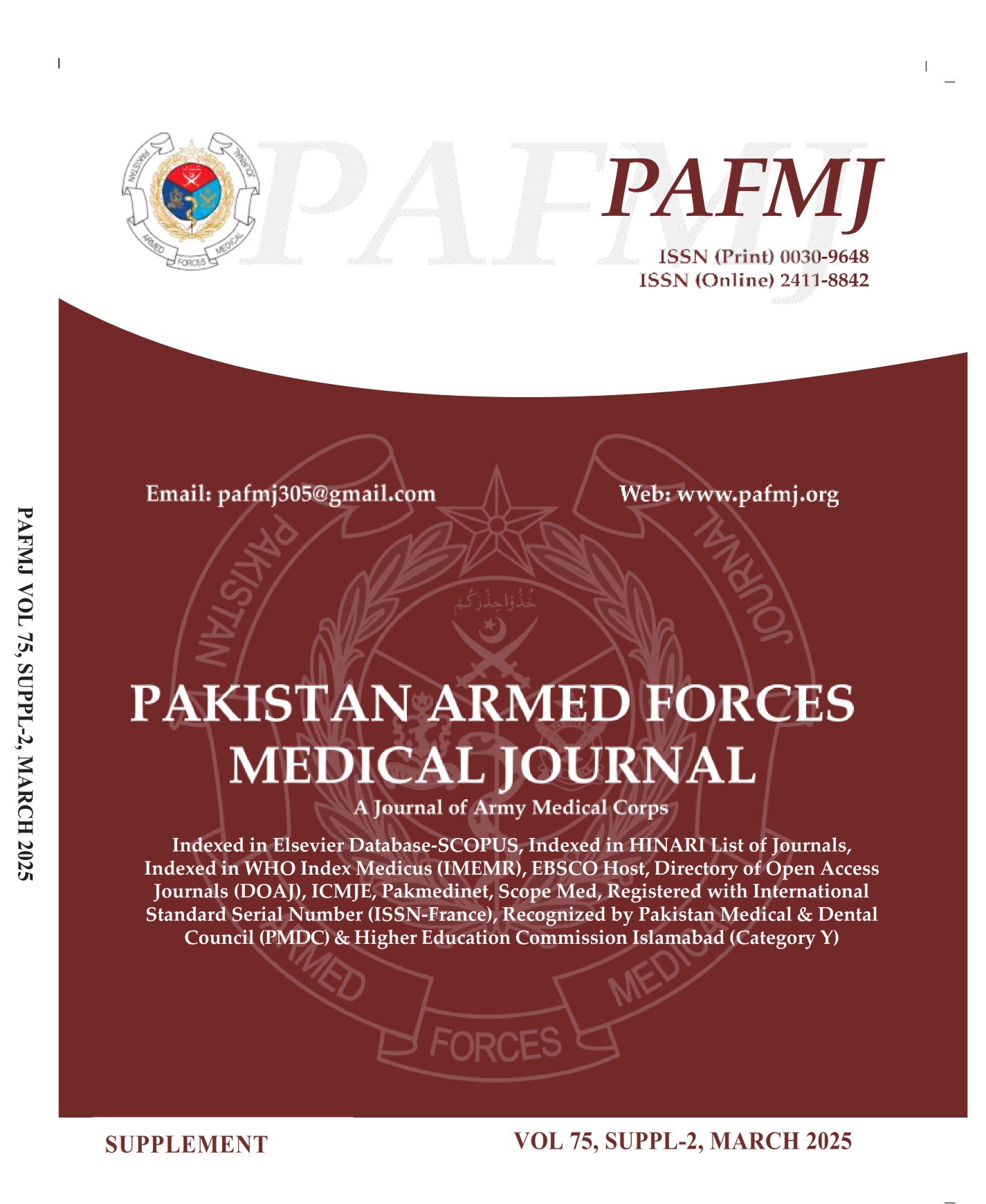Comparison of Primary Repair and Stoma Formation for Traumatic Gut Injury in terms of Frequency of Wound Infections
DOI:
https://doi.org/10.51253/pafmj.v75iSUPPL-2.12817Keywords:
Gut Injuries, Stoma Formation, Surgical Site InfectionAbstract
Objective: To compare primary repair and stoma formation for the patients with traumatic gut injury.
Study Design: Quasi-experimental study.
Place and Duration of Study: The study conducted at Rawalpindi Medical University and Allied Hospitals from Jun to Dec 2021.
Methodology: The study was conducted to compare primary repair and stoma formation in patients of traumatic injuries. The patients were divided in two groups: Group-A (primary repair) and Group-B (stoma formation), Surgical site infection was considered as a primary outcome.
Results: A total of 60 patients (30 in each group) were analyzed. The mean age in Group-A and Group-B was 30.7±15.57 years and 35.4±17.53 years, respectively. Surgical site infections occurred in 30% (n=9) of patients in Group-A and 63.33% (n=19) of patients in Group-B, with a statistically significant difference (p=0.009).
Conclusion: Primary repair is superior to stoma formation for the patients with traumatic gut injures.
Downloads
References
Aljehaiman F, Almalki FJ, Alhusain A, Alsalamah F, Alzahrani K, Alharbi A, et al. Prevalence, pattern, mortality, and morbidity of traumatic small bowel perforation at King Abdulaziz Medical City: a retrospective cohort study. Cureus 2024; 16(1): e52313.
https://doi.org/10.7759/cureus.52313
Abhishek K, Vidhyarthy AK. Study of patients with abdominal trauma in a tertiary care centre with special emphasis on factors influencing outcomes. Int J Acad Med Pharm 2023; 5(3): 85-89.
https://doi.org/10.47009/jamp.2023.5.3.19
Larsen JW, Soreide K, Soreide JA, Tjosevik K, Kvaloy JT, Thorsen K. Epidemiology of abdominal trauma: An age-and sex-adjusted incidence analysis with mortality patterns. Injury 2022; 53(10): 3130-3138.
https://doi.org/10.1016/j.injury.2022.06.020
Smyth L, Bendinelli C, Lee N, Reeds MG, Loh EJ, Amico F, et al. WSES guidelines on blunt and penetrating bowel injury: diagnosis, investigations, and treatment. World J Emerg Surg 2022; 17(1): 13.
https://doi.org/10.1186/s13017-022-00418-y
Hernandez PT, Paspulati RM, Shanmugan S. Diagnosis of anastomotic leak. Clin Colon and Rectal Surg 2021; 34(06): 391-399.
https://doi.org/10.1055/s-0041-1735270
Parini D, Bondurri A, Ferrara F, Rizzo G, Pata F, Veltri M, et al. Surgical management of ostomy complications: a MISSTO–WSES mapping review. World J Emerg Surg 2023; 18(1): 48.
https://doi.org/10.1186/s13017-023-00516-5
Clark M, Chur-Hansen A, Mikocka-Walus A. Systematic review with meta-analysis: Current and emerging models of preoperative psychological preparation for individuals undergoing stoma surgery. J Psychosom Res 2023; 168: 111211.
https://doi.org/10.1016/j.jpsychores.2023.111211
De Robles MS, Young CJ. Outcomes of primary repair and anastomosis for traumatic colonic injuries in a tertiary trauma center. Medicina 2020; 56(9): 440.
https://doi.org/10.3390/medicina56090440
Costabella F, Patel KB, Adepoju AV, Singh P, Mahmoud HA, Zafar A, et al. Healthcare cost and outcomes associated with surgical site infection and patient outcomes in low-and middle-income countries. Cureus 2023; 15(7): e42493.
https://doi.org/10.7759/cureus.42493
Zhang L, Zheng W, Cui J, Wu YL, Xu TL, Zhang HZ. Risk factors for nonclosure of defunctioning stoma and stoma-related complications among low rectal cancer patients after sphincter-preserving surgery. Chronic Dis Transl Med 2020; 6(03): 188-197.
https://doi.org/10.1016/j.cdtm.2020.02.004
Mishra M, Singh P, Tripathi A. Typhoid ileal perforation: comparative study of ileostomy versus primary ileal repair and associated morbidity and mortality. Int Surg J 2018; 5(9): 3129.
https://doi.org/10.18203/2349-2902.isj20183735
Ozpek A, Yıldırak MK, Ezberci F. Hollow viscus injury due to blunt abdominal trauma: a tertiary trauma center experience. Turk J Trauma Emerg Surg 2024; 30(2): 123.
https://doi.org/10.14744/tjtes.2024.67249
Tantardini C, Godiris-Petit G, Noullet S, Raux M, Menegaux F, Chereau N. Management of the injured bowel: preserving bowel continuity as a gold standard. BMC Surg 2021; 21: 1-7.
https://doi.org/10.1186/s12893-021-01332-x
Dilday J, Owattanapanich N, Benjamin ER, Biswas S, Shackelford S, Demetriades D. Operative management and outcomes of colorectal injuries after gunshot wounds in the deployed military setting versus civilian trauma centers. J Trauma Acute Care Surg 2023; 95(2S): S60-S65.
https://doi.org/10.1097/TA.0000000000004016
Cullinane DC, Jawa RS, Como JJ, Moore AE, Morris DS, Cheriyan J, et al. Management of penetrating intraperitoneal colon injuries: a meta-analysis and practice management guideline from the Eastern Association for the Surgery of Trauma. J Trauma Acute Care Surg 2019; 86(3): 505-515.
https://doi.org/10.1097/TA.0000000000002146
Tang MH, Wong JS, Chia CL, Lee DJ. Meta-analysis on surgical management of colonic injuries in trauma: to divert or to anastomose? Eur J Trauma Emerg Surg 2021: 1-8.
https://doi.org/10.1007/s00068-020-01555-2
Asif KH, Ghulam M, Sohail RA, Kirky B, Rizvi F, Irfan F. Primary repair versus colostomy in colonic injuries. Pak J Med Health Sci 2011; 5: 154-157.
Zaheer F. Primary versus delayed skin closure in patients with stoma reversal. J Surg Pak 2020; 25(2): 73-76
Downloads
Published
License
Copyright (c) 2025 Sumaira Ahmed, Asifa Dian Khan, Sadia Tasneem, Adil Ayoub, Ayesha Mureed, Sara Malik

This work is licensed under a Creative Commons Attribution-NonCommercial 4.0 International License.















